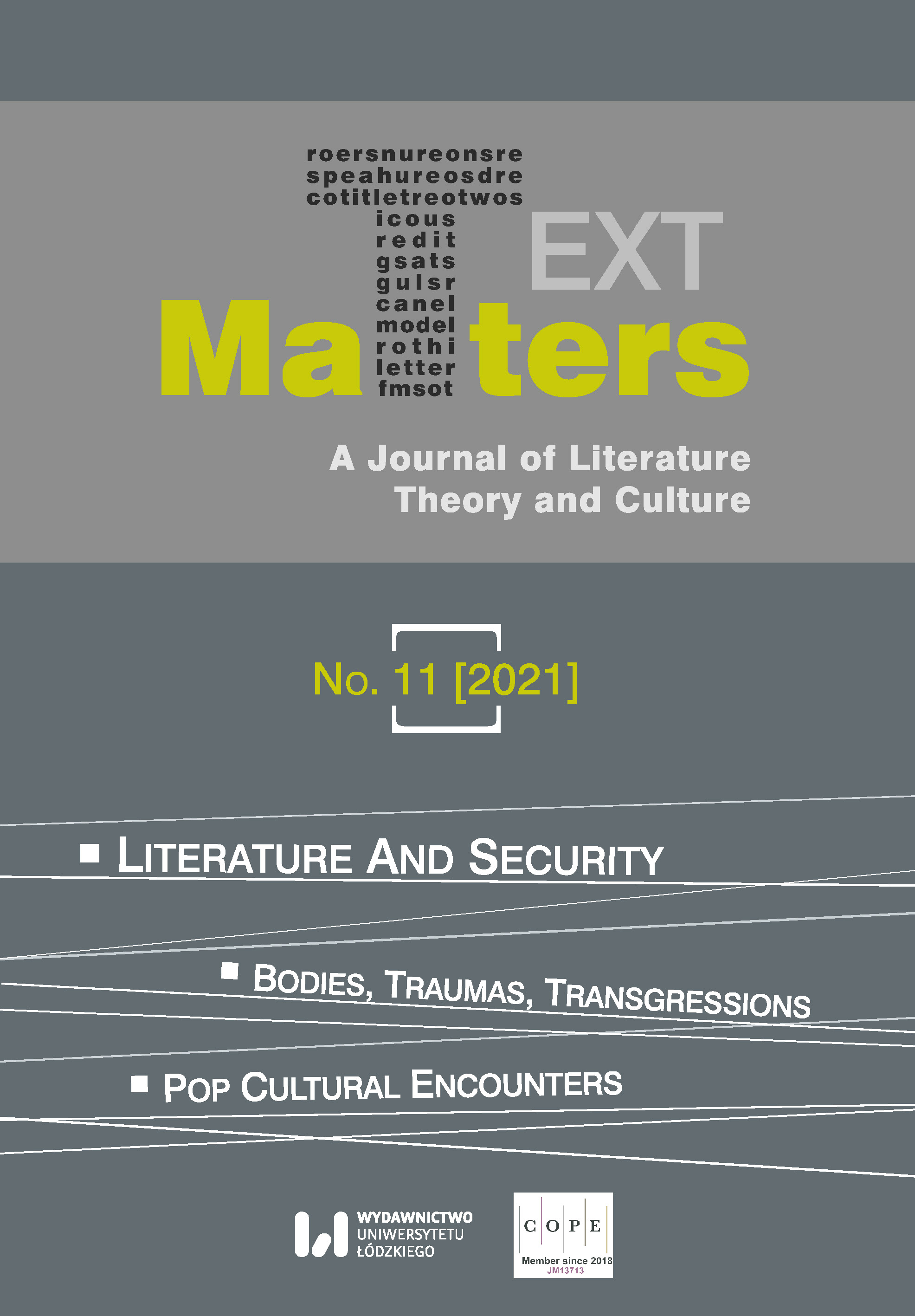“Brought up to Live Double Lives”: Intelligence and Espionage as Literary and Philosophical Figures in Ciaran Carson’s Exchange Place and For All We Know
DOI:
https://doi.org/10.18778/2083-2931.11.03Keywords:
surveillance, espionage, otherness, identity, translationAbstract
The article examines the figure of the spy—alongside themes related to espionage—as employed in two books by the Northern Irish writer Ciaran Carson (1948–2019): the volume of poems For All We Know (2008) and the novel Exchange Place (2012). Carson’s oeuvre is permeated with the Troubles and he has been hailed one of key writers to convey the experience of living in a modern surveillance state. His depiction of Belfast thematizes questions of terrorism, the insecurity and anxiety it causes in everyday life, as well as the unceasing games of appearances and the different ways of verifying or revising identities. In Carson’s later work, however, these aspects acquire greater philosophical depth as the author uses the themes of doubles, spies, and makeshift identities to discuss writing itself, the construction of subjectivity, and the dialogic relationship with the other. Taking a cue from Paul Ricoeur’s and Julia Kristeva’s conceptions of “oneself as another,” the article examines how Carson’s spy-figures can be read as metaphors for processes of self-discovery and identity-formation, tied to the notion of “self-othering.” Carson employs the figure of the spy—who juggles identities by “donning” different clothes or languages—to scrutinize how one ventures into the dangerous territory of writing, translation and love, as well as to reconsider notions of originality and self-mastery. Ultimately, Carson conceptualizes literature as specially marked by deceptions and metamorphoses, defining in these terms the human condition.
Downloads
References
Alexander, Neal. Ciaran Carson. Space, Place, Writing. Liverpool UP, 2010. https://doi.org/10.2307/j.ctt5vjcgf
Google Scholar
DOI: https://doi.org/10.2307/j.ctt5vjcgf
Ascherson, Neal. “Don’t Imagine You’re Smarter.” Review of My Life as a Spy, by Katherine Verdery. London Review of Books, vol. 40, no. 14, 19 Jul. 2018, https://www.lrb.co.uk/the-paper/v40/n14/neal-ascherson/don-t-imagine-you-re-smarter accessed 14 July 2021.
Google Scholar
Baker, Timothy C. “Second Time Round: Fugal Memory in Ciaran Carson’s For All We Know.” Review of Irish Studies in Europe, vol. 1, no. 1, 2016, pp. 1–17. https://doi.org/10.32803/rise.2016.01.02
Google Scholar
DOI: https://doi.org/10.32803/rise.v1i1.1240
Baltasi, Michael. Review of For All We Know, by Ciaran Carson; Collected Poems, by Ciaran Carson. Chicago Review, vol. 55, no. 1, 2010, pp. 167–71.
Google Scholar
Carson, Ciaran. Collected Poems. Gallery, 2008.
Google Scholar
Carson, Ciaran. Exchange Place. Blackstaff, 2012.
Google Scholar
Carson, Ciaran. “For all I know. Ciaran Carson in Conversation with Elmer Kennedy-Andrews.” Ciaran Carson. Critical Essays, edited by Elmer Kennedy-Andrews, Four Courts, 2009, pp. 13–27.
Google Scholar
Carson, Ciaran. Still Life. Gallery, 2019.
Google Scholar
Delattre, Elisabeth. “Exchange Place by Ciaran Carson or a Sense of Déjà vu.” Studi irlandesi. A Journal of Irish Studies, vol. 5, 2015, pp. 157–69. https://doi.org/10.13128/SIJIS-2239-3978-16342
Google Scholar
Delattre, Elisabeth. “‘Through the Forest of Language’: For All We Know by Ciaran Carson.” Estudios Irlandeses, vol. 7, 2012, pp. 10–18. https://doi.org/10.24162/EI2012-1531
Google Scholar
DOI: https://doi.org/10.24162/EI2012-1531
Gillis, Alan. “Acoustic Perfume.” Ciaran Carson. Critical Essays, edited by Elmer Kennedy-Andrews, Four Courts, 2009, pp. 254–74.
Google Scholar
Goodby, John. “‘Walking in the city’: Space, Narrative and Surveillance in The Irish for No and Belfast Confetti.” Ciaran Carson. Critical Essays, edited by Elmer Kennedy-Andrews, Four Courts, 2009, pp. 66–85.
Google Scholar
Hancock, Tim. “Ciaran Carson: The Spy in the Superior Turret.” Ciaran Carson. Critical Essays, edited by Elmer Kennedy-Andrews, Four Courts, 2009, pp. 142–60.
Google Scholar
Houen, Alex. Terrorism and Modern Literature. From Joseph Conrad to Ciaran Carson. Oxford UP, 2005.
Google Scholar
Kennedy-Andrews, Elmer. “Carson, Heaney, and the Art of Getting Lost.” Ciaran Carson. Critical Essays, edited by Elmer Kennedy-Andrews, Four Courts, 2009, pp. 227–53.
Google Scholar
Kennedy-Andrews, Elmer. “Ciaran Carson: The New Urban Poetics.” Shadows of the Gunmen. Violence and Culture in Modern Ireland, edited by Danine Farquharson and Sean Farrell, Cork UP, 2007, pp. 142–64.
Google Scholar
Kristeva, Julia. “It’s Just Not My Life—Julia Kristeva Responds.” Translated by Patsy Baudoin. Los Angeles Review of Books Blog, 11 Jan. 2018. https://blog.lareviewofbooks.org/essays/just-life-julia-kristeva-responds/ accessed 14 July 2021.
Google Scholar
Kristeva, Julia. Strangers to Ourselves. Translated by Leon S. Roudiez. Columbia UP, 1991.
Google Scholar
Kristeva, Julia. “The Love of Another Language.” Intimate Revolt. The Powers and Limits of Psychoanalysis. Volume 2, translated by Jeanine Herman, Columbia UP, 2002, pp. 240–54.
Google Scholar
McAdams, Dan P. “Narrative Identity.” Handbook of Identity Theory and Research. Volume I, edited by Seth J. Schwartz, Koen Luyckx and Vivian L. Vignoles, Springer, 2011, pp. 99–115. https://doi.org/10.1007/978-1-4419-7988-9_5
Google Scholar
DOI: https://doi.org/10.1007/978-1-4419-7988-9_5
Moi, Ruben, and Annelise Brox Larsen. “‘Second Time Round’: Recent Northern Irish History in For All We Know and Ciaran Carson’s Written Arts.” Nordic Journal of English Studies, vol. 13, no. 2, 2014, pp. 80–95. https://doi.org/10.35360/njes.305
Google Scholar
DOI: https://doi.org/10.35360/njes.305
Polizzotti, Mark. Sympathy for the Traitor. A Translation Manifesto. MIT, 2018. https://doi.org/10.7551/mitpress/10744.001.0001
Google Scholar
DOI: https://doi.org/10.7551/mitpress/10744.001.0001
Ricoeur, Paul. Oneself as Another. Translated by Kathleen Blarney. Chicago UP, 1992.
Google Scholar
Ricoeur, Paul. On Translation. Translated by Eileen Brennan. Routledge, 2006.
Google Scholar
Ríordáin, Clíona Ní. “Ciaran Carson and the Equilibrium of Language(s).” Études de stylistique anglaise, vol. 14, 2019, pp. 1–12. https://doi.org/10.4000/esa.3525
Google Scholar
DOI: https://doi.org/10.4000/esa.3525
Seed, David. “Spy Fiction.” The Cambridge Companion to Crime Fiction, edited by Martin Priestman, Cambridge UP, 2003, pp. 115–34. https://doi.org/10.1017/CCOL0521803993.008
Google Scholar
DOI: https://doi.org/10.1017/CCOL0521803993.008
Starnino, Carmine. Review of For All We Know, by Ciaran Carson. Poetry, vol. 193, no. 2, Nov. 2008, pp. 159–61, www.jstor.org/stable/20608364 accessed 14 July 2021.
Google Scholar
Verdery, Katherine. My Life as a Spy. Investigations in a Secret Police File. Duke UP, 2018. https://doi.org/10.1215/9780822371908
Google Scholar
DOI: https://doi.org/10.1215/9780822371908
Published
How to Cite
Issue
Section
License

This work is licensed under a Creative Commons Attribution-NonCommercial-NoDerivatives 4.0 International License.













